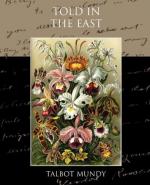And away in the distance rose the red reflection of a fire ten leagues away. The Mutiny of ’57 had blazed out of sullen mystery already, the sepoys were burning their barracks half-way on the road to Jundhra!
And down below, to the shadow where the Risaldar had stood, crept a giant of a man who had no military bearing. He listened once, and sneaked into the deepest black within the doorway and crouched and waited.
II.
Hanadra reeks of history, blood-soaked and mysterious. Temples piled on the site of olden temples; palaces where half-forgotten kings usurped the thrones of conquerors who came from God knows where to conquer older kings; roads built on the bones of conquered armies; houses and palaces and subterranean passages that no man living knows the end of and few even the beginning. Dark corridors and colonnades and hollow walls; roofs that have ears and peep-holes; floors that are undermined by secret stairs; trees that have swayed with the weight of rotting human skulls and have shimmered with the silken bannerets of emperors. Such is Hanadra, half-ruined, and surrounded by a wall that was age-old in the dawn of written history.
Even its environs are mysterious; outside the walls, there are carven, gloomy palaces that once re-echoed to the tinkle of stringed instruments and the love-songs of some sultan’s favorite—now fallen into ruins, or rebuilt to stable horses or shelter guns and stores and men; but eloquent in all their new-smeared whitewash, or in crumbling decay, of long-since dead intrigue. No places, those, for strong men to live alone in, where night-breezes whisper through forgotten passages and dry teak planking recreaks to the memory of dead men’s footsteps.
But strong men are not the only makings of an Empire, nor yet the only sufferers. Wherever the flag of England flies above a distant outpost or droops in the stagnant moisture of an Eastern swamp, there are the graves of England’s women. The bones that quarreling jackals crunch among the tombstones—the peace along the clean-kept borderline— the pride of race and conquest and the cleaner pride of work well done, these are not man’s only. Man does the work, but he is held to it and cheered on by the girl who loves him.
And so, above a stone-flagged courtyard, in a room that once had echoed to the laughter of a sultan’s favorite, it happened that an English girl of twenty-one was pacing back and forth. Through the open curtained window she had seen her husband lead his command out through the echoing archway to the plain beyond; she had heard his boyish voice bark out the command and had listened to the rumble of the gun-wheels dying in the distance—for the last time possibly. She knew, as many an English girl has known, that she was alone, one white woman amid a swarm of sullen Aryans, and that she must follow along the road the guns had taken, served and protected by nothing more than low-caste natives.




